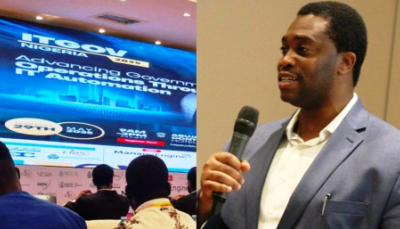Why a full interconnect settlement scheme will address interconnect indebtedness
Medallion Communications is one of the companies saddled with the responsibility of providing interconnectivity between networks. President/Chief Executive Officer, Mr. Ikechukwu Nnamani, shares with IT Edge News crew (MARTIN EKPEKE, ABUBAKAR MOSHOOD and ANTHONY NWOSU)on Medallion’s plans to set up a full interconnect settlement scheme that will allow interconnection between networks to happen within few weeks after the end of the billing cycle. Nnamani also spoke on MNP, broadband and increasing challenges associated with service quality in Nigeria.
Where is Medallion Communications in the scheme of activities in Nigeria’s ICT environment?
Medallion is a critical stakeholder in the Nigerian telecom industry. We have been able to play a critical role in data connectivity of networks and helping bridge the gap between the various operators, both big and small to ensure seamless interconnectivity. If you notice, before companies like Medallion came on board, delays in interconnection was a major issue, denial of interconnection was a major issue, high cost of establishing interconnect was a major issue. You don’t hear that anymore. In the last two to three years, I have not seen any major headline of anybody saying I have been denied interconnection. That is a critical role we played in bridging that gap and ensuring that the process to seek interconnection is now very seamless and also because we are a central switching hub and we have been able to reduce the cost of interconnection, and that is financial advantage to the operators. Rather than spend an average of two to five million US Dollars to set up a high interconnect link with an operator, and then duplicate this five different times in order to connect five operators, Medallion has been able to streamline that into one link and that is cheaper than what it used to be; and since we have been able to implement both TDM and IP type of interconnect, all operator types are covered. That is a critical role we played. As a lot of people know, we also operate a meet-me-room infrastructure where almost all the critical infrastructure in the country is located. A lot of service providers come to cross connect and interconnect with other carriers. We offer efficient infrastructure sharing service at a very affordable cost. Those are the impacts we have created in the industry so far.
Still on interconnection, clearing houses have been accused of adding to interconnect indebtedness in the industry, by implication Medallion is indicted. What is your reaction?
Let me correct that. What has happened in the interconnect space, especially as it affects the clearing houses, has evolved over the past one to two years. It has greatly evolved compared to what it was some years back. At the early stage we had a lot of challenges especially from major operators who vehemently refused to allow our class of services to survive. Most of them created a very difficult operating condition for us that we had to go back to the regulator to seek regulatory intervention. One of the core areas was the area of bank guarantees, where the operator insisted that we must give them bank guarantees but they were not ready to offer us a counter guarantee on the traffic that was to be passed by them through us. That led to a situation where you could not secure your own exposure to the operators, while they were secured in their exposure to you, so the direct result was a case where some operators terminated calls through the clearing houses and could not pay and the clearing houses were now exposed. Some of the operators currently complaining about the operations of the clearinghouses are the same operators that refused to help the regulator create an enabling environment for efficient interconnect clearinghouse service delivery to the industry. But I will want to say that in the last one to two years, there has been a drastic change in the interconnect space especially as it affects the clearing houses, because we have gotten to the point where the operators are passing traffic through the clearing houses and that is changing the dynamics of the industry. What is still not in place which we are in the process of fully setting up is a settlement scheme for interconnect; it is still not in place in the industry. Medallion is one of the companies that are at the fore front of setting up a full settlement scheme in such a way that interconnect settlement happens not more than a few weeks after the end of the billing cycle. In due course, we will be putting that information across to the industry and the model is being put together. We are certain that within the next few weeks, the industry will come to understand what that is all about, and how it will enhance issues that have to do with settlement pertaining to interconnect charges. We also have to be careful when we are talking of indebtedness because probably 90% of the indebtedness in the industry came about before the interconnect operators even came into the equation. These were debts sometimes attributed to NITEL and some other operators, and most of the debts are also in dispute, those were the debts resulting from traffic the operators pass directly amongst themselves without using the clearinghouses; that traffic that did not go through the clearing houses. The good thing about the clearinghouses is that whatever traffic it passes, three records are generated; the originator records, records from the clearinghouse and records at the terminating point. Amongst these three, we have an independent avenue to verify the call records. Unlike when a call is terminated using the old scheme, we have only two records; the originating and terminating. Both of them are competitors and have something at stake, so if there is a dispute there is no fair way to actually verify the accurate record since both parties come with their individual records for verification. . If you go back now to check the indebtedness in the industry you find out that a majority of the debt results from traffic that was passing directly among operators not through the clearinghouses. And if you take it a little step further and talk of disputed debts, you will find out that even among the clearing houses, it is very minimal, because we have a policy in place to resolve these issues unlike the calls passed directly amongst the operators.
Many people felt that mobile number portability died on arrival, to them people were already porting before the launch with the availability of double SIM phones and some using multiple phones. After few months of the launch, do you see it as a success or failure?
I see it as a success and let me explain why. If you check, the primary objective of mobile number portability is to ensure that subscribers have a choice to move from one network to another without any penalty of losing their number or the inability to do it. that is the primary objective; we need to be clear what the objective of mobile number portability was? It wasn’t a scheme to make subscribers move in large quantity to another network, which was the choice that was now left for the subscriber to exercise. As we are speaking today, the technical infrastructure to ensure that mobile number portability happen is in place and it is working. so from that point of view and in terms of what was offered to the Nigerian subscribers, it is a success because today if you want to port your number, you can go and port it without anybody preventing you from doing it. Now, the problem was that those people that were entrusted to manage the process, in my opinion need to do more to explain to people what it is all about. A lot of people were expecting that once mobile number portability is launched, you are going to see like 50% of subscribers from one network migrating to another network. NO! It is a choice. If a subscriber for whatever reason chooses not to take advantage of that opportunity, that’s their call, that’s what it’s all about. The regulator or those managing the databases are not in the position to force people to port. If you now want to look at it this way has it been successful? If you want to rate it based on the patronage from the people on porting their number, which will be a different ball game. As you know, Medallion as an interconnect operator is fully involved in the porting of routed calls. You need to separate mobile number portability into two phases; phase 1 is the porting process, where the subscriber says I used to be an MTN subscriber and I want to go to Glo but his number remains the same, yet getting all the benefits of a Glo subscriber. That’s the subscriber side of it. As an interconnect exchange operator in Medallion, we are not involved in that, there are people responsible for that, the success or failure of that, you have to go and ask them how are they going about it. But when it comes at routing of all calls within the country whether ported or not, we have set up the process, our network is fully compliant, we are routing all the calls that comes to us whether ported or not. Because that is what we needed to do as an interconnect operator in the market. From my own point of view and what I know, mobile number portability is to give subscribers a choice. We must not take that objective from it, maybe if I was involved in handling the subscribers part of porting, a different approach would have been taken to make it more successful, but as I said, Medallion is not involved in that. Let us leave it for those involved to sort out.
Federal government is working to get broadband inland from the shores; one of such moves is the National Broadband Plan 2013-2018 and the setting up of an Implementation Committee. If you are a consultant to government on ICT, what will your advice be to them?
Coincidentally, yesterday USPF had a stakeholder’s forum where they read out a strategic plan to ensure that broadband gets implemented. The idea was that for the urban area there is substantial coverage of infrastructure but the majority live in rural and semi urban areas and that is where there is no infrastructure to deliver broadband services. The goal of USPF in their Broadband Initiative Plan is to encourage the infrastructure providers with some financial benefits. They have a number of initiatives and one of them is to offer subsidy to operators. The other plan is if there are areas that the government wants some specific services, they would ride on third party and thereby offer the investor a ready market for the infrastructure being deployed. This is similar to what we have in electricity regulatory investment incentive plan, with the introduction of the bulk purchaser. For instance, where an investor deploys broadband infrastructure in rural areas, government may be willing to purchase that capacity and offer services at discounted rates to the populace. That way, it bridges the financial gaps which an investor would have suffered if it was operating at the rural area with minimum patronage and financial capacity of the population. That is one of the plans that is already in place. I believe this is a workable plan and I encourage it. Also the Ministry of Communications Technology was able to speak on how far they have addressed the issue of right of way which has been a major bottleneck. We, however, need to separate high speed internet access from local broadband connectivity of networks. There is broadband internet access but that is just one part of broadband. The bigger part of broadband, which is what we really need, is high capacity local connectivity for transporting local content. How will the banks’ ATM machines, point of sales terminals for those that wants to do mobile money, be connected? How will the branch networks of various multinationals be connected? How will the various educational institutions within the country be connected? How will the various internet exchange points be connected across the country so we can fully utilize the Nigerian .ng domain name? All these have nothing to do with global internet, so this is where our effort needs to be. We need to put fiber, fixed wireless with higher capacity, WiMAX networks for local connectivity first, and then we can handshake it with global community.
Some people believe that the problem with our Infrastructures, quality of services has to do with the equipment vendors like Huawei, ZTE that Nigeria is patronizing. They felt that you cannot compare the quality with the ones from Western vendors. Do you also think so?
On a theoretical basis, one could say yes. But you need to understand few things, and this is where we need to start tracing things backward. One, you have got the Technical Standard Department of NCC as a regulator. Before any equipment is installed in the country, it has to be type approved by NCC, and NCC has to check for compliance with some minimum standard the equipment has to meet based on ITU recommended minimum standard. So if there is any equipment that has been type approved by NCC, the understanding is that that equipment is good for use in Nigeria. That is the starting point, so the first question we need to ask ourselves is are the equipment being deployed type approved by NCC? If the answer is yes, then we have to assume the equipment meets minimum standard. That is the truth of the matter. At that time it does not matter the country the equipment was manufactured in. Even when your equipment has been deployed, NCC is supposed to come back and do a type approval of your network. It is also safe to assume that if your network gets approval from NCC, which means that the equipment you deployed meets minimum standard. So if there is a problem with quality and it has got to do with equipment, that means we have to go to NCC and ask questions; have these equipment been type approved? If they have, did they meet the minimum requirement? That is the way to address it. But the point you made is true. Let’s assume two equipment have met the minimum requirement, then of course as an investor, you have to look for equipment that is probably cheaper or for which you get a good vendor finance agreement with. You can’t run away from it, it is natural process that a potential investor has to do. If the Chinese which is the case today are offering you equipment with less cost outlay initially, you are likely to go for it. But in the area of quality of equipment, my view is that NCC’s Technical Standard Department is the one to address that issue. If the regulator says the equipment is type approved and they meet minimum requirement, anything we are saying is just speculation. One area that is of concern to me is the area of security, in recent time; some advance countries have blacklisted some equipment vendors because of national security concern. Those are things that as a Nigeria citizen, I am concerned about. Are our security agencies and regulators monitoring and keeping their eyes open to security implication of some equipment? I want to believe that if some advanced countries are concerned, then we also need to look at it. Let it be that we looked at it and we don’t have any reason to be concerned.




























